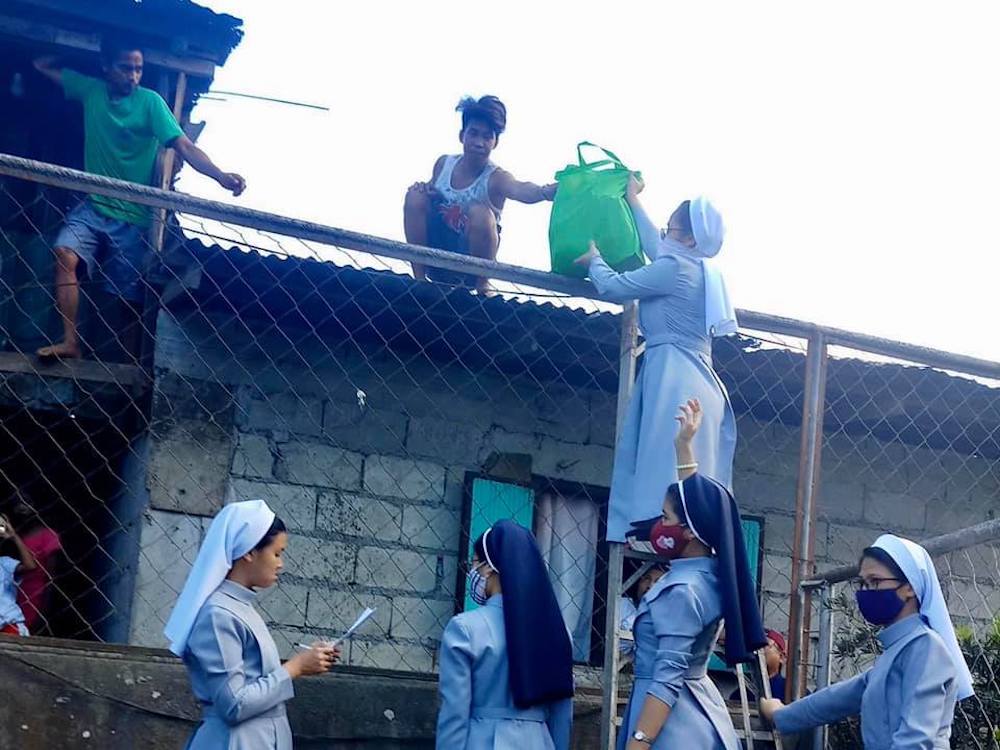
The Sisters of Charity of St. Charles Borromeo distribute food packs to the households of Barangay Francisco, Tagaytay City. (CBCP News/Sisters of Charity St. Charles Borromeo)
Editor's note: As part of our Coronavirus: A Year Later coverage, we invited leaders of women's congregational associations to reflect on how the pandemic has affected religious life in their regions. Some provided overviews; others focused on their individual congregations as emblematic of shared experience. This entry is from the Association of Major Religious Superiors of the Philippines.

(NCR, GSR logo/Toni-Ann Ortiz)
It's been almost a year since the Philippine government enforced quarantine restrictions in the Philippines. For some, it was a welcome break from the busyness of their regular lives, but for many consecrated men and women, it was a challenge to be more daring and to allow new and creative expression of their respective charisms amidst the changes in the world due to the pandemic.
The Joint Secretariat of the Association of Major Religious Superiors of the Philippines (AMRSP) received reports of the COVID-response from the different members. Common themes emerged. First was the desire to provide for the immediate needs of street-dwellers, those from the informal economy, and other daily wage earners. Individual institutes often had their own programs, depending on the availability of both human and material resources.
Social media helped connect potential donors to different initiatives like the Vincentian Family's "Vincent Helps" program, which coordinated all relief efforts of the Vincentians and the Daughters of Charity, especially for the street-dwellers. The Association of Major Religious Superiors of the Philippines, through the logistical and financial support of the different member congregations, initiated a centralized program for street-dwellers and daily wage earners. Many similar initiatives were done by different women religious not only in metro Manila, but also in the provinces and in the peripheries. It was inspiring to see many congregations reach out to the most affected vulnerable brothers and sisters.
Advertisement
Among others, the efforts of the Sisters of Charity of St. Charles Borromeo and the Daughters of St. Anne were noteworthy as they went to the peripheries to bring basic needs to the affected families. Many consecrated persons went out to distribute food packs from their own fruits of sacrifices with those whose means are daily wages, that is, the "no-work, no-pay." Many women religious directly prepared cooked meals for their neighborhood and for the street dwellers, and even for the men in uniform who were manning the checkpoints. Another beautiful image of creative charity was that of the Missionary Sisters Servants of the Holy Spirit and the Missionary Benedictine Sisters of Tutzing, who welcomed street dwellers and stranded individuals in their schools. There was much joy in the different expressions of solidarity!
The second theme was the desire to provide housing support for medical professionals and other frontline workers who were seen as "undesirable" in their respective communities, or had a hard time commuting to work because of the suspension of all public transportation services across the country. Many institutes of consecrated life, particularly those operating schools, opened their classrooms and other facilities to temporarily house these frontline workers.
In coordination with the AMRSP, among those to first open their facilities were the Religious of the Virgin Mary, the Sisters of St. Paul de Chartres, the Franciscan Missionaries of Mary, the Daughters of Charity of St. Vincent de Paul, the Claretian Missionaries, the De La Salle Brothers, the Religious of the Good Shepherd, the Holy Spirit Missionary Sisters-North Province, the Order of Friars Minor, and Order of Hospitalier Brothers of St. John of God. Other congregations also had their own initiatives to support frontline workers, such as the provision of packed meals and medical supplies (including face masks and face shields). Noteworthy are the efforts of the Jesuits' "Tanging Yaman" Foundation, the Pious Disciples of the Divine Master, and the Sisters of St. Paul de Chartres.
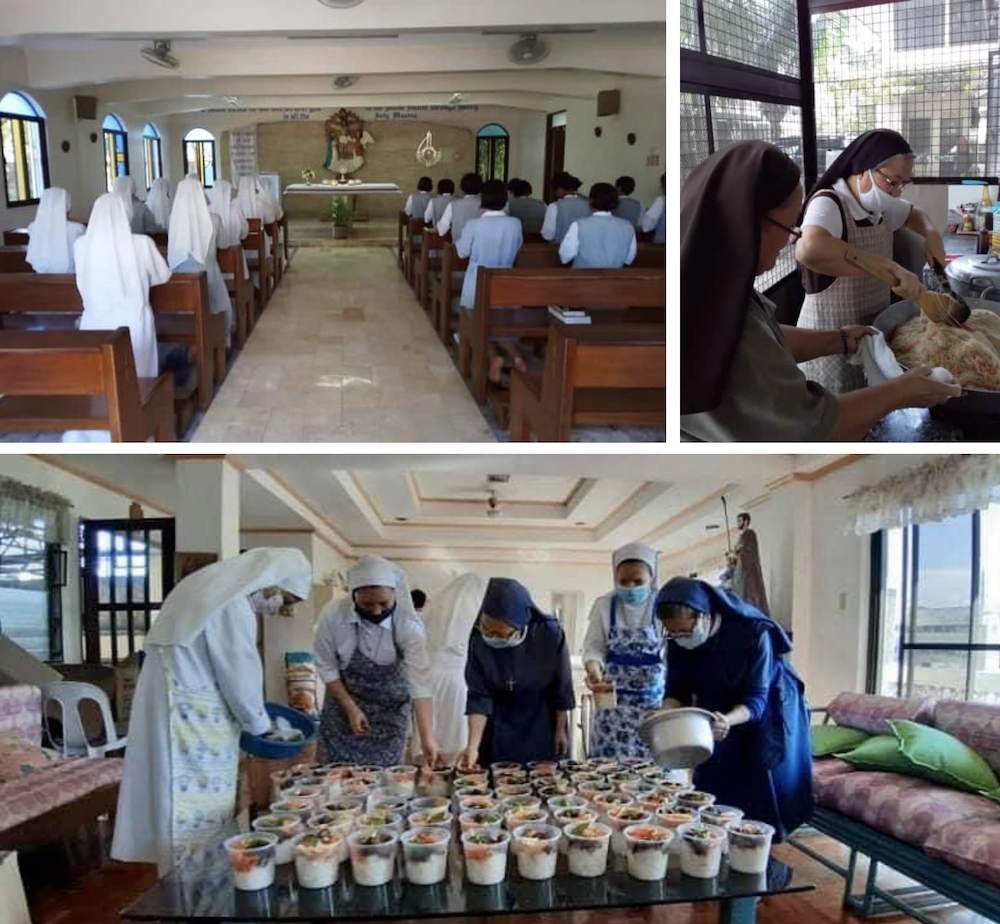
Top left: The Missionary Sisters of Jesus the Eternal Priest in Parañaque City, Philippines, pray on their knees for divine intervention March 25, 2020. (Sr. Leonor Vallejos); Top right: The Carmelite Missionaries prepare food for their neighbors in Quezon City, Philippines. (Sr. Marigold Magbanua); Bottom: The Pious Disciples of the Divine Master sisters provide meals those working on the frontlines during the COVID-19 pandemic. (Association of Major Religious Superiors of the Philippines)
Congregations in the healthcare ministry also continued with their compassionate service during this period. The Sisters of St. Paul of Chartres, which operates the largest network of Catholic hospitals in the Philippines, instituted a plan of action for their hospitals, whether as COVID-19 referral centers, or as secondary hospitals to decongest government health facilities in their areas.
The importance of the ministry of prayer emerged as the third theme. Many congregations instituted daily eucharistic adoration for the particular intention of the health and well-being of the sick and the medical workers and had their elderly sisters as their "prayer warriors." Consecrated men and women also participated in the "Healing Rosary for the World," a weekly program instituted by the Manila Cathedral after the initial invitation of Pope Francis. The AMRSP coordinated the online broadcast on May 6, which was also simulcast over TV Maria and Radio Veritas. More than 40 institutes participated in the program, which has gathered more than 600 thousand views on Facebook and YouTube.
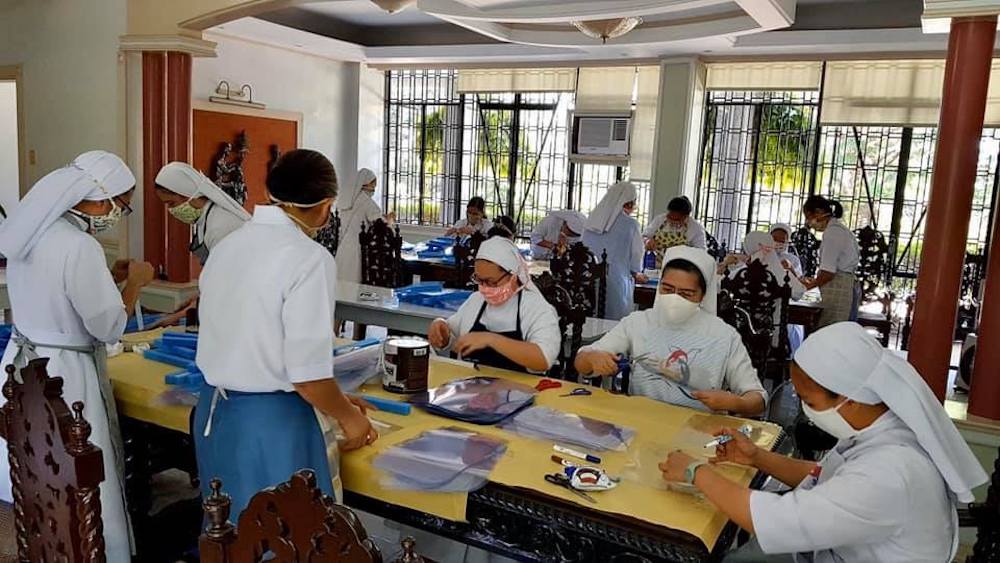
The Sisters of St. Paul de Chartes in the Philippines support frontline workers by producing face shields. (Association of Major Religious Superiors of the Philippines)
Noticeable, too, is the shift to using social communications to do ministry. Many institutes have become more visible and active on social media sites such as Facebook and YouTube, harnessing those platforms' potential in reaching out to their students, collaborators and other partners. At the same time, together with the change to online classes, many formation sessions, webinars, and even recollections and retreats have also shifted online.
The pandemic definitely changed the lives of people all over the world, including that of the consecrated women. The COVID-19 pandemic forced us pause, rethink, and be more creative in expressing our charisms today.
—A. Crisvie Happy Montecillo
The world has been halted to a standstill with COVID-19 and its subsequent upgrading to a pandemic. All of a sudden, an avalanche of information and disinformation had humanity in a deluge of fear, panic and anxiety like no other that has happened in history. Within a span of little bit more than a year, terms like "new normal,", "conspiracy theories," "social distancing," "QR," "quarantine," "lockdown," "isolation" and the like have become ubiquitous in the ordinary parlance of humanity. These terms serve as common denominators of the global language, and most of all, the dreaded virus is still very present and real.
As a Dominican religious, I am taking this phenomenon in the context of Pope Francis' reflection in an editorial published April 17, 2020, by the Spanish magazine Vida Nueva, to "see the coronavirus pandemic in the light of Christ's resurrection." In times like this, it is very easy to give in to despair and hopelessness. However, as religious, despair does not have a place in our lives. We have the strength of an alleluia people, and as such, it is just a matter of discerning the subtle gem of God's message behind this global phenomenon.
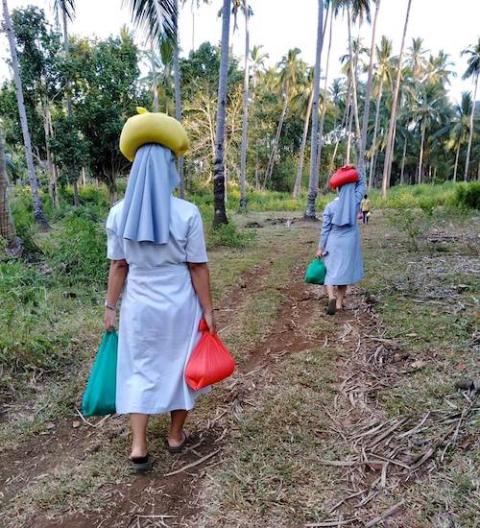
The Daughters of St. Anne travel to the remote area of Bacolod, Lanao del Norte to distribute rice to the families living there. (Courtesy of the Daughters of St. Anne)
As consecrated people, we do not easily succumb to desperation. We have the best of weapons that enable us to rise above any catastrophe in life, even that of a global pandemic. So, viewing the mystery of this catastrophe in the light of our faith, and more so, in the light of our consecration, we can clearly see the supremacy of God, who is omniscient and powerful Father. He is still in control! Despite of the chaos that this pandemic has caused, life for us, as religious, must go on.
This is a fact that the beauty of our consecration is put to a crucible, as everything else in our routine conventual life is altered. The communal life of sisters, especially in convents where majority of the members are senior citizens, is greatly affected, as community schedules and prayers are designed for social distancing and other health protocols. With lockdowns, our sisters' mobility in the apostolate is halted, and our visibility to the people we serve is greatly diminished, if not totally obliterated.
Education, as the main apostolate of our congregation, is put into extreme jeopardy with the immediate switch from physical to virtual presence of students in the classroom, through digital interventions. This necessitates web expertise of teachers, and our aging sisters who are still active in the classroom but are considered digital aliens, are simply lost. Thus, congregational leadership has to find means to continue with the apostolate in different and relevant platforms.
Another great impact that this pandemic has caused among us religious is the cessation of the reception of the most important source of strength of our life: the celebration of the Eucharist. It causes so much pain for us to be deprived of the main source of grace at the very time when we most need it. However, this deprivation has not diminished our zeal for the apostolate. In our effort to fortify ourselves with grace, we focus our attention to our interior life. As we are forced to isolation and quarantines, we find more time to replenish our soul by clinging tenaciously to the Lord in prayer. In our experience of mental agony, we find more time to recourse to the reassuring Word of God in the Scriptures.
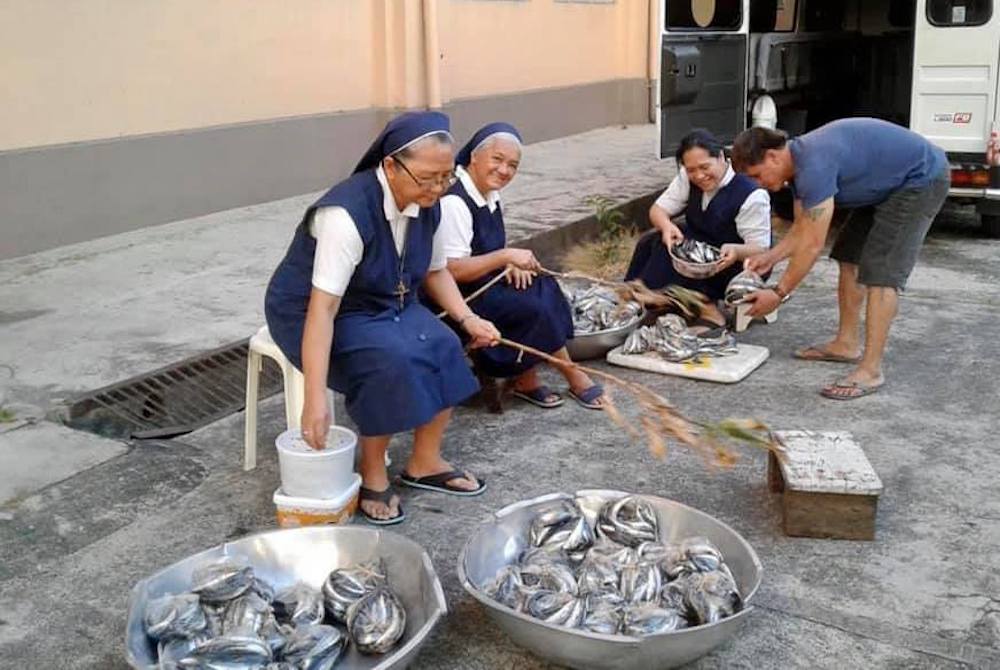
The Missionary Sisters Servants of the Holy Spirit-Northern Province provide seafood to day laborers, people whose jobs disappeared during the pandemic, in Quezon City, Philippines. (Sr. Angel C. Libron)
As a congregation, we were not spared of the daily struggles our fellow citizens underwent due to this pandemic. We experienced community lockdown for two weeks at the motherhouse and generalate compound. We experienced how to be isolated, and felt the stigma of being suspected carriers of the dreaded virus and most of all, we also lived the dreadful waiting of the swab test results.
Because of the experiential reality, though very difficult, it opened our eyes to the veracity that not only are we in a difficult situation, but more than anyone else, the most vulnerable members of the society, our less privileged brothers and sisters, are in a much tougher position. This propelled us to be more giving and to be more caring. Some of our communities gave up snacks and opted for simpler food choices. A very important celebration in the life our congregation had to put on hold, to be able to share food with our neighbors and the frontliners. We also intensified our communal and personal prayers for the end of the pandemic and for the safety of everyone. The daily exposure of the Blessed Sacrament from 6 in the morning until 6 in the evening has been our haven of refuge.
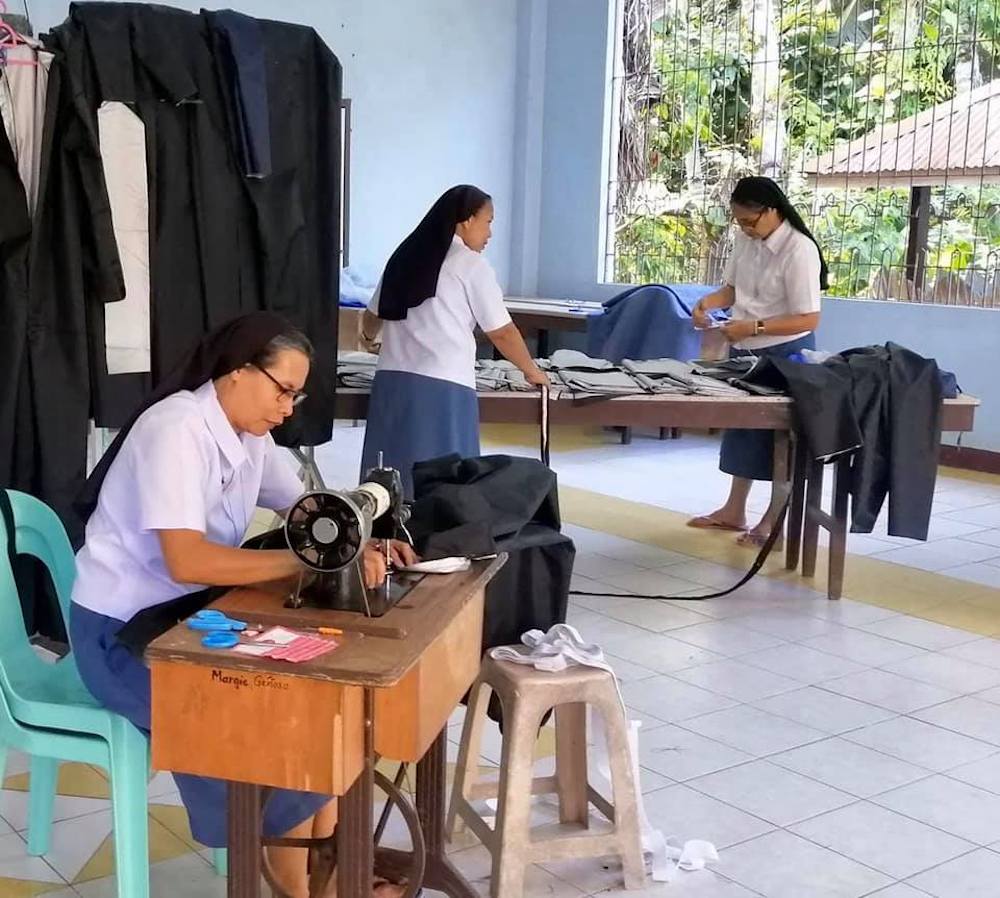
The Missionary Sisters of Mary sew personal protective equipment for those working on the frontlines of the pandemic in Butuan City, Philippines. (Sr. Pam Lonoy)
As we are in the Lenten season and will celebrate Easter for 2021, we expect more somber church activities. This, however, does not detract from the reality of Christ's presence in those celebrations. Holy Week and Easter are still the best times for spiritual reflection. However, for those who have only to rely on virtual ceremonies and celebrations, it is totally depressing.
This can lead to a crucial question: Where is Christ in these holy and blessed days, and at the time of this pandemic when we need him the most? Is Christ absent? No! Christ is present in his people's hunger for the sacraments and other sources of grace that this pandemic has deprived them to avail. Christ is in the consecrated people and devoted laity who are storming the heavens with their prayers to stop this pandemic. Yes, Christ is with us all the time and we have to shout aloud to the world that despite of this dehumanizing pandemic, we are alleluia people: full of hope, full of strength and full of love!
—Nemia Daral








